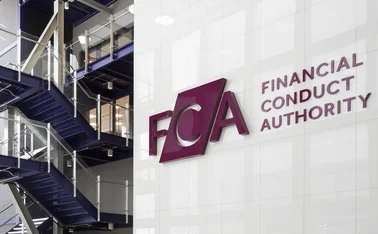
Did the Gibraltar regulator miss the warning signs?

The Gibraltar Financial Services Commission has once again fallen under scrutiny after Enterprise Insurance became the third major insurer to collapse in the tax haven in recent years.
The Gibraltar Financial Services Commission has fallen under scrutiny after Enterprise Insurance became the third major insurer to collapse in the tax haven in recent years.
In July, the commission directed Enterprise to cease effecting new contracts after discovering the company had an asset shortfall of £18m, leaving half a million policyholders in limbo.
As the GFSC began winding up proceedings, the chief justice of the Gibraltar Supreme Court described the company as “hopelessly insolvent”, prompting questions as to why the GFSC hadn’t acted sooner. So what is really going on in Gibraltar?
Enterprise and the regulator
“We’re still unravelling the background and context of how Enterprise got where it is,” said Peter Taylor, director of legal, enforcement and policy at GFSC. “We have had concerns about the company for a while, and during that time we’ve had it under close supervision.”
The GFSC made enquiries about the insurer in the early part of the year. On finding that the financial position was not as strong as first thought, it discovered the company was, in Enterprise’s own words, insolvent.
“That was a very different position to what we had originally understood to be the case,” he added. “We were placed in a position of no alternative but to insist that the company immediately find the funds to cure the position.
“It then confirmed to us it was unable to do that, and the inevitable steps had to follow. We then applied for the liquidation of the company.”
On 22 July, the GFSC ordered Enterprise to cease effecting new contracts. Six days later, the appointed liquidator Freddie White advised policyholders to find new cover.
“In three months [as of August], I’ll report back to the Supreme Court on the financial position of the company and my recommendations to the court,” said White.
“I am aiming for a target date of mid-September. It’s in most people’s interests to have it sooner rather than later.”
The Gibraltar insurer graveyard
To understand why Enterprise’s insolvency has raised questions about the GFSC, the insurer’s collapse has to be viewed through the context of the Gibraltar insurance market over the past half-decade.
To some, the rock has become something of a tombstone over the head of a myriad of failed insurers in recent years. A quick Google search reveals a graveyard of former companies, all displaying a liquidator’s epitaph outlining winding up orders.
To the GFSC however, the assertion the environment in Gibraltar is in some way different to the UK or elsewhere is false. “I’m not aware of statistics that say the situation in Gibraltar is any different from other jurisdictions,” said Taylor.
“The issues faced in Gibraltar are faced in other jurisdictions as well. If we look at why there was a need for Solvency II, it wasn’t because of issues being faced by insurance businesses in Gibraltar. It was issues being faced in the insurance market generally.
“There are common issues in insurance markets in all jurisdictions, so it would be wrong to say there are unique situations facing Gibraltar.”
The Prudential Regulation Authority lists 503 UK insurers as of January 2016. The Financial Services Compensation Scheme is involved in 65 UK insolvencies, dating back to 1985. That represents 12.9% of today’s UK insurers.
On the GFSC website, the commission lists the companies licensed to “carry on insurance business” in Gibraltar. Of the 61 listed, 15 are no longer authorised to enter into or renew contracts of insurance, 12 of which ceased doing so in the past four years, which translates to 24.5%, almost a quarter, of Gibraltar insurers.
Michael Ashton, senior finance centre executive for Gibraltar Finance, HM Government of Gibraltar, said: “There are a number of reasons for this. Some of those businesses will have stopped underwriting quite some time ago and effectively are in run-off. Once that run-off is completed, the insurance company completely closes down.
“Certainly Solvency II has had an impact. There was a period prior to the beginning of this year where people were waiting to see what was going to happen. Some probably thought: ‘Do we want to hold that level of capital in a captive in Gibraltar, when it’s easier to streamline the number of the captive operatives we have?’ So there’s been a rationalisation process.
“Does that mean Gibraltar is moving towards a smaller number of larger units? That probably is the case.”
It’s not the numbers, though, that stick in people’s minds. In 2012, insurers Hill and Lemma collapsed. Both companies were weakly capitalised, sparking debate over the effectiveness of the GFSC. The commission responded by claiming that Lemma’s problems were the result of the actions of a related company, Lemma Ukraine, based in Kiev, and, therefore, external to Gibraltar.
The liquidator for Hill, however, found there had appeared to be “significant fraud from the outset in that no share capital was ever paid into the company and the purported capital on which the company relied for regulatory and trading purposes did not exist”.
White, who in addition to Enterprise was also the liquidator for Lemma, agreed with the GFSC analysis however.
“As anyone who is active in the insurance market knows, what companies are facing since the 2008 crash is a very different set of circumstances to what they faced in the ‘good old days’,” he said.
“Underwriting results could be pretty neutral, and some profits were made on investment returns. It’s a very different situation now in terms of investment returns and it’s more focused on making an underwriting profit. These are factors that apply to all general insurers at the moment. It’s not a Gibraltar-specific issue at all.”
Did the commission do enough?
So who is accountable, aside from the company itself, for the collapse of Enterprise? Could the outcome have been different if the GFSC had acted sooner?
“There are a number of reasons why Enterprise’s financial position wasn’t identified earlier,” Taylor explained. “One was in terms of the information we were receiving from the company, its reported accounts, and that its position was not apparent.
“It was only when we received direct information from the finance director that the position became clear.”
A former director of a now collapsed Gibraltar insurer, who didn’t want to be named, said: “Could the GFSC have handled this better? Hindsight is always a wonderful thing. The GFSC can only act on the information it has available and there will always be a degree of information asymmetry between a regulator and the market.
“The message could probably have been handled better, particularly in the early days when statements made by the GFSC contradicted those made by other regulators. However, the failure of the business was down to the fact that shareholders were unable or unwilling to inject further capital and this is not something which a regulator can control.”
The source claimed there had been a great deal of negative market comment for some time surrounding the company, following publicly available information that revealed that Enterprise had come close to breaching its solvency requirements in the past.
“In addition, a key fundraising exercise last year by its holding company failed to achieve its objective. An argument could no doubt be made that the GFSC should have stepped in at that point,” the source added.
“Unfortunately, it is likely that the outcome would have been the same regardless of whether action had been taken now or six months ago.
“The fact is that, while the company was meeting its capital requirement, the GFSC would probably not have been able to stop it trading. The regulator took action as soon as it was completely clear that the financial position had changed.”
Jason Smart, CEO of Gibraltar-based Elite Insurance, agreed. “The irony is that the regulatory environment in Gibraltar is extremely tough,” he said. “The change in regulation in Gibraltar over the last 10 years has been dramatic. It’s a very tough regime. It is very hands-on, and intrusive. Going by the advice we’ve received, the regulator in Gibraltar is very comparable with the tough regime you would get in Ireland, and of course the UK.
“If you want my honest opinion, if you went back 20 years, ‘soft touch’ would be the correct description of the GFSC. Certainly Solvency II has been very heavily embraced. For us as a business, it has added a huge amount of cost, because it is being implemented as heavily, if not heavier, than some other domiciles.
“I’ve got to be honest and say I don’t think Enterprise’s demise is anything to do with the GFSC. I don’t think it is because the GFSC is not paying attention or not doing its job properly.”
Lessons to be learnt and the future of Gibraltar insurance
So what has really changed over the past four years in Gibraltar, and what happens next for the domicile? “If anything, I would say that the regulation regime there is so tough now, and has become so increasingly tough over the past few years, it’s actually flushing out some of the weaker insurers,” said Smart.
“Maybe that’s the case rather than these insurers going bust because the GFSC is not doing its job properly.”
Ashton said: “Over the last few years the GFSC has looked to strengthen financial services regulation in Gibraltar. That’s manifested in a new CEO, a new in-house actuary and other appointments.
“The government has increased the budget to give the GFSC greater resources and manpower. The number of people employed in the GFSC has increased over the last two to three years.
“It’s about making sure the regulatory environment for insurance is at the same level as in any major European economy.”
A Gibraltar insurance lawyer, who did not want to be named, said: “The barriers to entry are significantly higher today under Solvency II.
“Any new Gibraltar company seeking to be licensed today would be required to hold capital of at least 120% of the solvency capital requirement – future entrants would have to be niche, with an established track record, strong management in their chosen markets and well capitalised to withstand a one-in-200-year event.
“Enterprise is unfortunate, and upsetting, but will not be repeated. The company was set up to write UK legal expenses business under Solvency I, over 10 years ago, and following UK reforms in the legal services market, expanded into new classes of business and overseas markets. That can no longer happen, and should not be allowed to happen, under the new Solvency II regime.”
The lawyer added: “There are many success stories in Gibraltar and Enterprise is an exception. Lessons can and will be learnt.”
For Enterprise Holdings, the parent company of Enterprise, the insurance company’s collapse has prompted the need to explore new avenues of revenue. The group is looking to secure additional capacity from an alternative reinsurer for its managing general agent Andeva.
Enterprise Holdings believes that this will allow for the expansion of Andeva’s offering, generating premium volumes “similar to levels historically enjoyed by Enterprise Insurance”.
Andeva’s managing director Rachel Harris was contacted for an interview, but refused to comment on the grounds that the press surrounding Enterprise’s collapse, and the half a million policyholders affected, had been negative.
The former Gibraltar director added: “Will Enterprise’s failure change the regulatory environment? The GFSC will seek to investigate internally whether it could have acted sooner or acted differently and take the lessons from this failure.
“Those companies that are not in a strong financial and capital position, or which are considered higher risk for other reasons, will find themselves subject to increased scrutiny. This isn’t a bad thing, as it will serve to strengthen the market by raising standards.
“Those companies that have always been well managed and well capitalised will be unlikely to experience any difference in the regulatory approach.”
With so much depending on the outcome of European Union negotiations post the triggering of Article 50, the future of Gibraltar’s insurance market, and the regulatory environment, remains open. There is no doubt, however, that if in future another insurer in the tax haven is found to be insolvent, questions will once again be asked.
Only users who have a paid subscription or are part of a corporate subscription are able to print or copy content.
To access these options, along with all other subscription benefits, please contact info@postonline.co.uk or view our subscription options here: http://subscriptions.postonline.co.uk/subscribe
You are currently unable to print this content. Please contact info@postonline.co.uk to find out more.
You are currently unable to copy this content. Please contact info@postonline.co.uk to find out more.
Copyright Infopro Digital Limited. All rights reserved.
As outlined in our terms and conditions, https://www.infopro-digital.com/terms-and-conditions/subscriptions/ (point 2.4), printing is limited to a single copy.
If you would like to purchase additional rights please email info@postonline.co.uk
Copyright Infopro Digital Limited. All rights reserved.
You may share this content using our article tools. As outlined in our terms and conditions, https://www.infopro-digital.com/terms-and-conditions/subscriptions/ (clause 2.4), an Authorised User may only make one copy of the materials for their own personal use. You must also comply with the restrictions in clause 2.5.
If you would like to purchase additional rights please email info@postonline.co.uk








